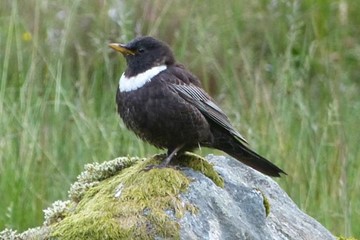RSPB research on Ring Ouzels
24th April 2014

"RSPB Scotland scientists have uncovered new evidence that could help to halt the dramatic decline of a rare upland bird. Scotland’s population of ring ouzels – popularly known as mountain blackbirds - has dropped by 36% since 1999 and these striking birds are vanishing from many of their former haunts in the rocky hillsides and gullies of the highest parts of the country. As the elusive birds begin to return to breed in the uplands from wintering in the mountains of North Africa, a long-running project in the Cairngorms has shone new light on the mystery of their disappearance and offered fresh hope for giving them a home. Intensive research at Glen Clunie in Aberdeenshire has suggested that the decline there is likely to have been caused by a drop in the survival of young birds in their first year. It is thought that the low survival rate could be influenced by a lack of suitable habitat. Ring ouzels are known to forage for invertebrates in short grass and a mix of grass and heather early in the summer, before switching their diet to blaeberry and rowan berries later on. They also need access to deeper vegetation, such as heather, to hide their nests and newly-fledged young. Scientists now hope that creating suitable habitats at breeding grounds could help to attract the birds with safe nest sites and abundant foraging areas, as well as concealing young birds from predators."
Ring Ouzels breed extensively in Skye and Lochalsh though little is known of overall numbers and distribution. Image of a bird at Kintail by Rule Anderson.


